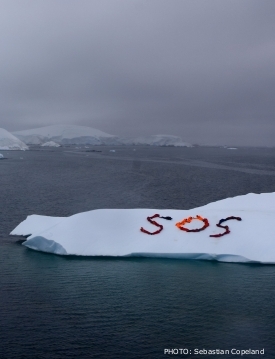

ABC Radio National: Ockham's Razor dives into sea level rise
The CEO of Green Cross Australia, Mara Bun, reports on what will happen if sea levels continue to rise. According to scientists we could experience an 88cm rise by the end of the century if greenhouse emissions keep increasing and this will have catastrophic effects on vast populations globally.
Transcript: This transcript was typed from a recording of the program. The ABC cannot guarantee its complete accuracy because of the possibility of mishearing and occasional difficulty in identifying speakers.
Robyn Williams: Today's talk is about climate and sea-level rise. No, don't think you've heard it all before because this talk is really about you and your concerns about the facts and about the policies that flow from them.
You may remember nearly ten years ago there was a consensus conference here about genetic engineering. Really a kind of trial, during which experts were brought in on both sides (if there are really two sides), arguments were heard, and a jury, made up of disinterested citizens, listened, thought and then pronounced.
The exercise is now, as I speak, on once more. This time it's a question of possible sea level rise, the displacement of our Pacific neighbours, perhaps others too in the region, and what we in Australia might do about the consequences.
Mara Bun, Head of Green Cross Australia, comes from Brazil, but lives in Brisbane.
Mara Bun: This is a story about people on the move in the 21st century. The story twists through exploding population growth and coastal migration, it turns on uncertain scientific models, it delivers unpopular messages for baby boomers heading into retirement. But if we plan ahead, we get to write a final chapter full of compassion and commonsense.
Preparing to adapt our coastlines won't be easy or cheap. It may involve moving lots of people to higher ground, and it will certainly involve protective engineering feats. It will be complicated, requiring much crystal ball gazing into uncertain scientific projections. We will need to think about biodiversity as well as people, because we actually need each other to survive.
Rich countries like Australia will need to dig deep to assist countries with much more limited resources to adapt.
Partnerships between countries will become more vital than ever. Millions of people will be displaced along the way.
Here's the bottom line that governments around Australia and our region are whispering about, but are too afraid to openly discuss: we need to reverse migration away from the coasts, and you can imagine how popular that message will be for political and business leaders alike.
For Australia, the risk of sea level rise is especially critical because of predicted impacts on our Asia Pacific neighbours. A 2007 study published by the journal Environment and Urbanisation ranked the vulnerability of the world's countries to sea level rise. The five countries with the largest total population living in threatened coastal areas are China, India, Indonesia, Bangladesh and Vietnam. These are our neighbours and surely their problems will inevitably become our own.
Get your head around this statistic: according to the IPCC a one-metre sea level rise will displace 145-million people, and over 90% live in Asia Pacific. Aceh and other catastrophic natural disasters have taught us that people strive to rebuild within their own cultures and national borders after natural disasters occur. But at the moment, there is no international law that gives rights to people displaced by climate change. And there is no doubt that some people will be forced by nature to cross national borders.
Think about the controversies about a single boatload of refugees reaching Australian shores. Then think tens of millions of people on the move in our region following water and food shortages, extreme weather, and crumbling infrastructure.
The story gets complicated here, because the climate system knows no borders. To avoid the biggest barbed-wire solution in history, first the countries of our region need to agree on a regional burden sharing agreement that allows some people to cross borders, if things get dire. That's a big ask. It took a horrific world war to create the 1951 Refugee Convention that protects the rights of people due to religious or political persecution.
But even if we manage to find a peaceful way forward, we will be doomed to replay the horror show unless we manage to cut greenhouse emissions along the way. This is why: a typical Pacific Islander produces a small fraction of the greenhouse gasses of a typical Australian. If populations shift across borders, greenhouse emissions must be controlled, otherwise the impacts of climate change will be fast-tracked. Countries like Australia need to dramatically reduce our own carbon footprint if we are to find a humane and sustainable solution to mass displacement.
This is a real challenge. Its dimensions reach from science and economic development, to humanitarian assistance, sustainable infrastructure, international law and greenhouse mitigation policy.
Given that we know what's at stake, why aren't more people talking about this already unfolding situation? How can we begin to plan a response, given that the first chapters of the story are pretty clear?
How can government, industry and the community sector begin to tackle this largest collective human challenge together?
The short answer is - we need to break through our obsession with today's news or even next year's news to begin grappling with the real issues of our time. Our leaders are tragically locked into continuous opinion polling and short-term election cycle and profit worries.
The feedback loops that guide our politicians and business leaders are completely geared towards short-term milestones. The relentless short-term news cycle makes it really hard for our leaders to respond to longer term, more complex, but potentially much more dangerous risks.
The Rudd government is showing signs of courage by focusing on longer term climate change impacts. When the public wakes up to the reality that managing longer term risks is very expensive but very necessary, politicians will need more community support than ever to lead us through what could be a harsh adjustment period. When the next election is at stake and weekly household budgets are pinched, it's easy to see why our leaders don't dwell too much on the impact of seas that rise by 3-millimetres each year.
I hope by now you agree that this issue deserves national attention.
Fortunately, democracy can help us think clearly.
In ancient Athens, the birthplace of modern democracy, the most important regular political event was the Assembly, where ordinary citizens met to consider and vote on important decisions of the day. The Athenian word for democracy, demokratia, is a compound made up of two words: Demos means the people and Kratia means grip. Democracy is all about people getting a grip on problems that need resolving.
Taking a page out of this democratic heritage, communities around the world are experimenting with new ways of engaging ordinary citizens in crucial policy debates. One proven model, called a Consensus Conference, has been used across Scandinavia, Europe, the US and Australia to engage ordinary citizens in policy development for issues such as nuclear waste disposal, human cloning, and regulation of genetically modified food.
Right now, the largest Consensus Conference about climate change in the world is happening right here, in Australia.
Between June and September this year, Green Cross has helped to organise a 'National People's Assembly' of ordinary citizens who are debating how Australia should prepare for the humanitarian consequences of sea level rise in the Asia Pacific. This People's Assembly is driven by a Citizens' Panel that acts like a jury that listens to input from an expert Steering Committee, made up of experts from all relevant areas. After intensive expert briefings from experts from the CSIRO, four major universities and business and community leaders, the Assembly will meet to consider options for action, and will make recommendations to the Rudd government about what should be done.
Why has Green Cross Australia, the new local chapter of Mikhail Gorbachev's International NGO inspired this project? Our mission is to foster a global values shift towards a secure and sustainable future, and we believe that informed debate about the really big issues is step number one.
The first Australian Consensus Conference was held in 1999 about Genetically Modified Food, with great success. It was instrumental in persuading the Howard government to establish the Office of Gene Technology Regulator, as well as mandatory labelling for GM foods, both policy reforms were direct recommendations of that initiative's Citizen's Panel.
So who's who on the People's Assembly Steering Committee?
Griffith University is project host, drawing on its extensive climate adaptation research expertise. Melbourne University's Asialink Centre provides foreign affairs and climate security leadership, and the 'Climate Change, Refugees and International Law' project at the Gilbert & Tobin Centre of Public Law at the University of New South Wales brings knowledge of international law reform options for sharing the burden of mass displacement.
Inspiring community leaders such as World Vision CEO Tim Costello, Australian Conservation Foundation President, Ian Lowe, and eminent human rights barrister, Julian Burnside are donating their time and insights to advise the Citizen's Panel. Practical feedback is provided by Engineers Without Borders, a community organisation that delivers sustainable engineering projects in our region. The Australian Defence Force is represented on the Steering Committee to help the Panel think through security implications and the role of defence forces when extreme weather emergencies occur.
Business leaders play a crucial role on the Steering Committee. Research and practical wisdom is provided by Munich Re, the world's largest reinsurance company, Insurance Australia Group, our largest general insurer, and the sustainability group of Worley Parsons, our largest engineering services firm with major investments in solar-thermal technology and operations in the Asia Pacific region.
What about the Citizens' Panel?
Three months ago an advertisement was placed in The Australian, calling for people to nominate for participation in a democratic process about the risks associated with sea level rise. After sifting through dozens of applications from around the country, organisers selected a group of 14 ordinary Australians from all States, who represent a cross-section of age, gender and occupation.
The Citizen's Panel ranges in age from 17 to 69. It includes a high school student from Mt Isa, a young medical doctor of Indian descent from Perth, a retired Sydney-based chemical engineer, and a practicing member of the Anglican church from Adelaide, a town planner from Brisbane is also included, just to name a few.
These are ordinary people from around Australia, kind of what the Prime Minister's 2020 Summit would have been like if your friends and neighbours had been invited to come up with good ideas for the future. A consensus conference is a powerful way to combine expert knowledge with community wisdom.
On August 29th, the Citizens' Panel deliberated and they've come up with their report, a recommendation to government on what should be done. You can read about it on the Green Cross Australia website.
So why does this initiative matter?
Sea level rise is a sleeper in the climate change debate. The impacts are gradual, the science is obscure, and apart from a growing number of Pacific Islanders, the victims are relatively invisible.
Ask yourself this question: If this story seems plausible, if the risks feel real, then shouldn't we form an Assembly to send a message to our leaders that we want them to plan for tomorrow's future today?
Robyn Williams: Up to us, if the system works. Mara Bun is Head of Green Cross Australia, based in Brisbane.
Copyright © Green Cross Australia | Terms & Conditions | Privacy Policy
web design brisbane :: (zero)seven


